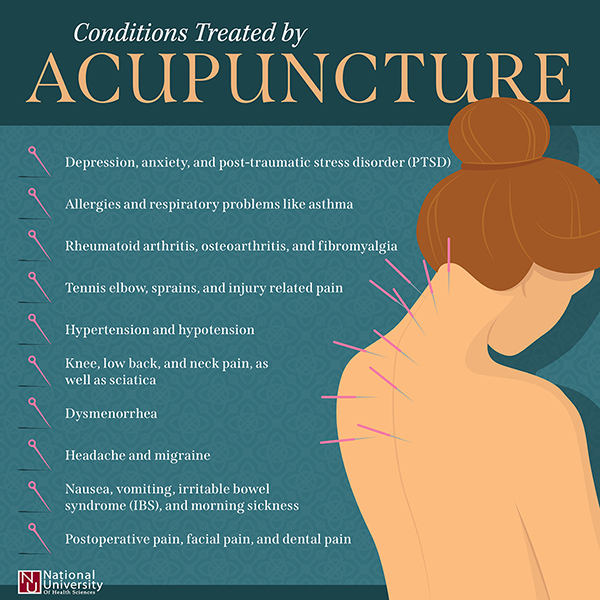Are you interested in a career in an alternative health care field that will allow you to spend more time with your patients than MDs to get to the root of their problems and concerns?
If so, an acupuncture career might be a rewarding path! To help you make a decision to pursue an education in this field, here is valuable insight into what acupuncturists do, what acupuncture training involves and the acupuncture job opportunities available to you after graduation.
What is an Acupuncturist?
Let’s start with the basics. Acupuncture, one of the five main branches of Oriental medicine, is an ancient healing technique that is over 3,000 years old. Acupuncture promotes healing by rebalancing the patient’s Qi (sometimes referred to as chi) energy, because if the Qi is weak, excessive or blocked, it can result in illness and disease.
Like other branches of alternative medicine, the philosophy behind acupuncture is about the healing and restoration of the whole person through techniques that are time-tested and minimally invasive.
Before giving treatment, an acupuncture practitioner will assess a patient’s symptoms using a set of diagnostic skills that include four areas: questioning, palpation, visual inspection and olfactory-auditory data collection. They will then use the results to determine the necessary treatment strategy going forward.
Most often, acupuncture treatments involve inserting thin, sterile needles into strategic points on the body that lie along specific energy meridian pathways. However, acupuncture practitioners can also apply electronic stimulation, magnets or lasers to acupuncture points for enhanced healing. Other meridian and point therapies could also include acupressure, the application of heat through moxibustion, drawing out energy through cupping, and a specialized massage system called Tui Na.
What Does Acupuncture Treat?
While there are many myths out there, the reality is that acupuncture isn’t just for headache or back pain relief.

In fact, the World Health Organization (WHO) recognizes acupuncture and Oriental medicine as effective treatments for more than 43 conditions, including:
- Allergies and respiratory problems such as asthma
- Depression, anxiety and post-traumatic stress disorder (PTSD)
- Dysmenorrhea
- Fertility
- Headaches and migraines
- Hypertension and hypotension
- Nausea, vomiting, irritable bowel syndrome (IBS) and morning sickness
- Neurological disorders including multiple sclerosis, Parkinson’s disease and stroke
- Pain management for the neck, shoulder, back, tennis elbow, knees, feet and injuries
- Post-operative pain
- Facial and dental pain
- Rheumatoid arthritis and osteoarthritis
What Acupuncture Job Opportunities are Available?
One of the greatest advantages of acupuncture careers is the flexibility that they can provide. Skilled practitioners have a variety of acupuncture job opportunities available to them in a range of professional settings.
Acupuncture practitioners are able to:
- Start their own solo practice
- Work as an associate in a group practice
- Practice in an integrative care center
- Work in a hospital
- Practice in pain management clinics, fertility clinics, weight loss or addiction treatment centers
- Work in cosmetic and spa facilities
Now that you know what kinds of acupuncture careers are possible, your next question is probably, “How much does an acupuncturist make?” After all, if you’re going to invest in acupuncture training, you want to be sure that you’ll be able to make a good living.
According to Glassdoor, the average annual base pay for an acupuncture practitioner is $75,884. Keep in mind this number could vary based on your geographic location, speciality, and experience level. Additionally, acupuncture careers often allow you to choose your frequency of patients, which means more flexibility and a strong work/life balance.
Many National University of Health Sciences (NUHS) students choose to obtain dual degrees in areas such as chiropractic medicine, naturopathic medicine or massage therapy to be able to expand their scope of practice. The dual degree option saves students time and tuition since many of the required classes for these disciplines overlap.
How Can You Become an Acupuncturist?
The first step to becoming an acupuncturist is attending an accredited university. The National University of Health Sciences program is unique in that it not only provides a solid foundation in the basic sciences of western medicine, its clinical interns gain experience with patients in an integrative medical setting with other health care disciplines. It also covers the history, theory and philosophy of acupuncture, as well as training in diagnosis and treatment planning.
Another unique opportunity that NUHS offers acupuncture students is an internship at Chicago’s Stroger Hospital.
After graduating, you must pass the licensing examinations conducted by the National Certification Commission for Acupuncture and Oriental Medicine (NCCAOM). Currently, 47 states and the District of Columbia require passage as a prerequisite for licensure.
Once you have passed the exam, you must apply for licensure in the state in which you plan to practice. Be sure to become familiar with the licensing and continuous education requirements of the state where you want to practice.
Now that you know a bit more about what acupuncture is, what it can treat and what acupuncture careers are out there, an NUHS Admissions Counselor can help you determine if this field is right for you. They will be happy to provide you with more information, or help you start your application to begin your path to this exciting career
{{cta(‘b7d331ad-fee8-45d2-9abd-f26523a7e68e’)}}




0 Comments